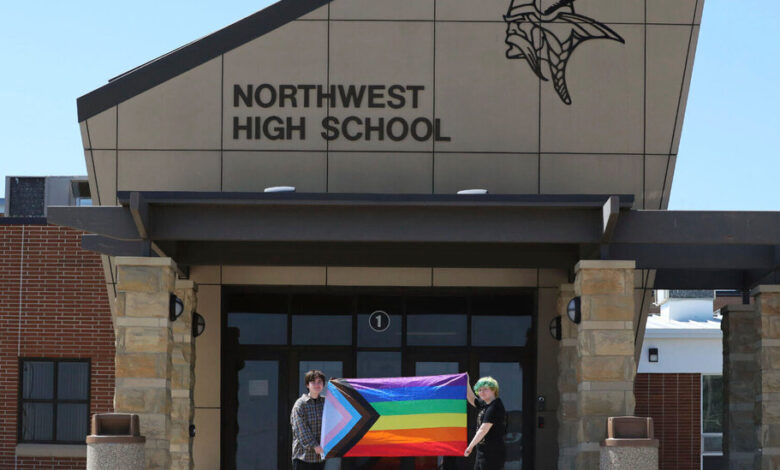Nebraska School Shuts Down Student Newspaper After L.G.B.T.Q. Publication

On March 31, the first period bell at Northwest High School in Grand Island, Neb., had just rung when the principal walked into a journalism classroom adorned with punctuation posters to deliver a new rule directly from administrators.
Students, including at least three who were transgender, were ordered to use the names they were given at birth for bylines because using their preferred names was “controversial,” according to a former student who was in the classroom and a lawyer for the Student Press Law Center.
In response, the student journalists dedicated their final issue in June to L.G.B.T.Q. issues, writing two columns on the topic and a news article about the origins of Pride Month. Then, after publication, the school retaliated, said Mike Hiestand, the Student Press Law Center lawyer.
Northwest Public Schools administrators and the superintendent, Jeff Edwards, shut down its newspaper program in June, infuriating student journalists and press freedom advocates who have denounced the move as censorship.
“I think they said that if they can’t stop it, can’t control it, then they’re just going to get rid of it,” Mr. Hiestand said of the school officials.
The elimination of the program and the student newspaper, Viking Saga, was first reported by The Grand Island Independent on Wednesday. The paper, which had about 15 students on staff, had been in print for 54 years at Northwest High, which has about 700 students and is the district’s sole high school in Grand Island, a small city about 95 miles west of Lincoln, the state capital.
Mr. Edwards and Tim Krupicka, the former principal, did notrespond to emails and calls seeking comment last week. Mr. Edwards told The Independent that cutting the program was an “administrative” decision.
Zach Mader, the vice president of the Northwest Public Schools board, declined to comment last week. But he told The Independent that there had been talks of “doing away with our newspaper” if the board saw content deemed “inappropriate.” He said that when the final issue came out, there had been “a little bit of hostility amongst some.”
“There were editorials that were essentially, I guess what I would say, L.G.B.T.Q.,” Mr. Mader told The Independent.
Max Kautsch, a First Amendment rights lawyer who works on media law cases in Nebraska and Kansas, said by phone that Mr. Mader’s comments were evidence of discrimination against a certain viewpoint and censorship.
“The motives aren’t a mystery,” Mr. Kautsch said. “The motives are to squelch the opinion of students who feel positively toward L.G.B.T.Q. movement.”
The shuttering of the paper was the latest instance of students contending with school officials seeking to prevent the distribution of yearbooks or the publication of articles, particularly in cases dealing with L.G.B.T.Q. issues.
In May, school officials in Longwood, Fla., ordered stickers to be placed over a photo spread in the Lyman High School yearbook showing students protesting a new state law that prohibits classroom instruction and discussion about sexual orientation and gender identity in some elementary school grades.
Last August, school officials in Arkansas removed a two-page year-in-review spread from one high school’s yearbook that mentioned the pandemic, the murder of George Floyd and the 2020 election.
“It’s something we’re definitely seeing more of,” Mr. Hiestand said.
At least 16 states have laws intended to safeguard school publications from interference. A similar measure died in the Nebraska Legislature this year.
Marcus Pennell, 18, is a transgender man who was among the students in the newspaper class at Northwest High this spring. He graduated this year and said by phone that the administrators’ decision to shut down the school’s newspaper was disheartening.
“Honestly, I felt so defeated,” Mr. Pennell said.
He added that his journalism teacher, Kirsten Gilliland, who declined a request for comment last week, delivered the news to students in June, saying: “I don’t know who, or really why, but this is what happened.”
In the final issue, which featured two rainbows on the front page, Mr. Pennell wrote an editorial that appeared under the name he was given at birth, Meghan, as dictated by the school’s new policy. In it, he discussed Florida’s “Don’t Say Gay” bill, writing, “The more resources students have available to put into words what they are feeling, the more ready they’ll be for anything, or any person, that life throws at them.”
Students who had enrolled in the journalism class this fall were put in other classes, Mr. Hiestand said. Mr. Pennell said a friend of his was switched into a random “animal science class.”
It was unclear if students and their parents planned to pursue litigation in the hopes of reinstating the newspaper and journalism program. Mr. Hiestand said it was “something that is being contemplated, but I think it is a ways off.”
Mr. Pennell said he felt bad for the students who may never experience the thrill and pressure of deadlines inside Northwest High.
“It would be nice if the paper could come back,” he said. “But obviously that’s out of my hands and out of our hands.”